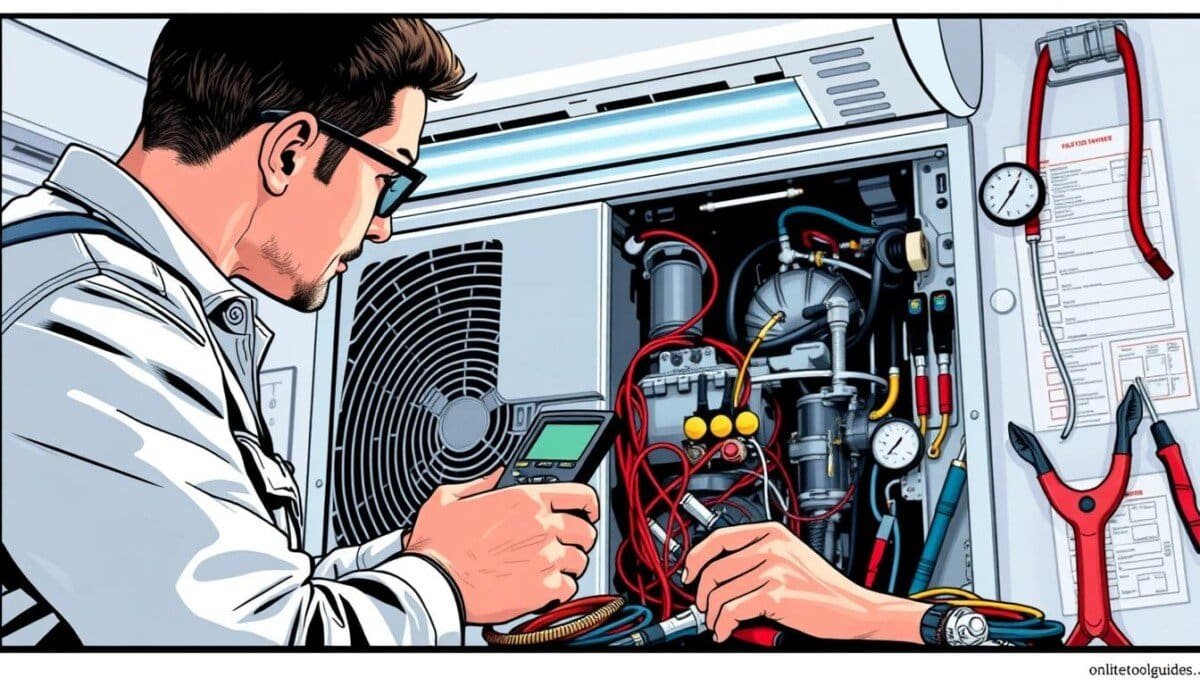Did you know that over half of home energy use is for heating and cooling? This shows how important a working AC unit is. When your AC doesn’t cool, it can make your home uncomfortable. Knowing how to fix this can save you money and keep your home cool.
By acting fast, you can avoid bigger problems like bad air quality. In this guide, we’ll show you how to find and fix common AC issues. We’ll also share tips for keeping your AC in top shape. This way, your home will stay cool all year.
Key Takeaways
- Over 50% of home energy use goes to heating and AC.
- 20-40% of cooled air can be lost through duct leaks.
- Monthly filter replacement is crucial for optimal airflow.
- Regular inspections of compressor and evaporator coils enhance cooling efficiency.
- Addressing thermostat problems can improve temperature regulation.
- Many homeowners are unaware of the energy waste stemming from HVAC issues.
Understanding Common Causes of AC Malfunctions
Air conditioning units might fail to deliver cold air for many reasons. Finding the main problem is key to fixing it. Here are the top reasons why ACs malfunction.
Dirty Air Filters
Dirty air filters are a big reason for AC problems. They need to be changed every three months. This keeps the air flowing well and the system working right.
Homeowners with pets might need to change filters more often. They might need to do it every 30 days.
Refrigerant Leaks
A refrigerant leak can really hurt an AC’s performance. If the refrigerant level goes down, the air coming out might be warm. Spotting a leak early can save a lot of money on repairs.
Regular checks are important to keep refrigerant levels right. This helps avoid big problems.
Thermostat Settings
Thermostat settings can also cause AC problems. If the thermostat is off or broken, the AC won’t cool right. Make sure to check and adjust the thermostat often.
Faulty Compressor
Problems with the compressor can be mechanical, electrical, or from lack of care. A bad compressor means hot air coming out. It’s important to fix any signs of trouble fast.
Keeping up with maintenance can help the compressor last longer. This makes the whole system work better.
| Common Issues | Description | Recommended Actions |
|---|---|---|
| Dirty Air Filters | Clogged filters restrict airflow, causing inefficiency. | Change filters every 1-3 months. |
| Refrigerant Leak | Low levels of refrigerant reduce cooling capacity. | Check for leaks and recharge refrigerant as needed. |
| Thermostat Malfunction | Incorrect settings prevent optimal cooling. | Regularly inspect and calibrate the thermostat. |
| Faulty Compressor | Mechanical issues lead to improper cooling. | Schedule regular maintenance and immediate repairs. |
Basic Troubleshooting Steps to Take
When your air conditioning unit stops working, there are simple steps to take. These steps can help find and fix problems quickly. By following these tips, you can make sure your AC works well.
Check the Thermostat
The first thing to do is check the thermostat. Make sure it’s set lower than the room’s current temperature. Smart thermostats save energy, which is a good choice. If it’s set right and still doesn’t work, try replacing the batteries.
Inspect Circuit Breakers
Then, you should inspect circuit breakers. A tripped breaker stops your AC from working. Find your electrical panel and see if the breaker for your AC is off. If it is, just flip it back on. But if it keeps tripping, you might need a pro to check it out. Additionally, while checking your home’s electrical systems, it’s a good idea to troubleshoot other devices, too. For instance, if you’re trying to troubleshoot PlayStation power issues, ensure the console is plugged into a working outlet and check if the power cord is damaged. Similar to your AC, persistent electrical problems with other devices may require professional assistance.
Clean or Replace Air Filters
Keeping your air conditioning system in good shape is key. Make sure to clean or replace air filters every three to six months. Dirty filters block airflow and make your AC less efficient. A clean filter helps air move better, making your AC cooler.
When to Call a Professional
Knowing when to get expert help is key for your air conditioning system. Basic fixes can solve many problems. But, some issues need a pro to ensure safety and efficiency. Spotting these signs early can save time and avoid bigger problems.
Signs You Need Expert Help
- Frequent system malfunctions during hot weather mean it’s working too hard.
- Ice on the system is a sign of trouble; turn it off until it melts.
- Refrigerant leaks are hard to find and need special tools.
- Broken evaporator coils make air blow hot; cleaning alone won’t fix it.
- Clogged air filters for more than three months cut cooling power a lot.
Benefits of Professional Maintenance
Professional maintenance boosts your HVAC system’s life and performance. Experts make sure everything works right. Regular checks include:
- Cleaning the evaporator and condenser coils well.
- Looking for refrigerant leaks and air duct problems.
- Swapping out dirty filters and stopping future breakdowns.
These actions make your home more comfortable and save energy. This means lower bills for you.
Seasonal Maintenance Tips for Your AC
Keeping your air conditioning system in top shape is key. Cleaning Condenser Coils and checking Ductwork can make it work better. Here are some important tasks for the cooling season.
Cleaning Condenser Coils
It’s vital to clean Condenser Coils often. Dirt can block airflow and lower cooling power. Here’s how to keep them clean:
- Clear the area around the condenser unit of leaves and debris.
- Use a soft brush to clean the coils of dirt.
- Use a fin comb to fix any bent fins that block airflow.
Checking Ductwork Integrity
Checking Ductwork helps find problems that block airflow. Cracks or damage can let cool air escape. Here’s what to do:
- Look for damage, pests, or blockages in the ductwork.
- Seal any gaps to keep cool air inside.
- Clean the ducts to stop dust and debris from blocking airflow.
Scheduling Regular Inspections
Get a certified HVAC pro to check your system often. They’ll look at a few important things:
- They’ll check the refrigerant level and look for leaks.
- They’ll clean electric parts to keep everything safe.
- They’ll make sure your thermostat is working right.

By following these steps, your AC will run better. Cleaning Condenser Coils, checking Ductwork, and regular inspections can avoid big problems. This keeps your air conditioning system working well.
Energy Efficiency Considerations
Homeowners and HVAC experts focus on energy efficiency. They look at SEER ratings, maintenance, and insulation. These steps improve cooling performance a lot.
SEER Ratings Explained
SEER, or Seasonal Energy Efficiency Ratio, shows how well air conditioners work. Higher SEER means better energy use. Choose AC systems with a SEER of 15 or more for big energy savings.
Benefits of Regular Maintenance
Regular checks keep air conditioners running well. The benefits are:
- It makes them more energy-efficient, saving money on bills.
- It stops expensive repairs and sudden failures.
- It makes the AC last longer with good care.
Annual checks and cleaning the condenser coils are key. They keep systems running efficiently.
Improving Home Insulation
Good insulation helps save energy. It keeps cool air in and warm air out. Focus on:
- Attics
- Walls
- Basements
- Air ducts and vents
Improving insulation boosts energy efficiency. It makes sure AC systems work well.
| Factor | Impact on Energy Efficiency |
|---|---|
| SEER Ratings | Higher ratings mean better energy use. |
| Regular Maintenance | It keeps systems running right and saves energy. |
| Home Insulation | It keeps cool air in and reduces system work. |
Frequently Asked Questions
Knowing how your air conditioning works is important for keeping it running well. Here are answers to common questions about AC care. We focus on changing air filters, spotting refrigerant leaks, and fixing AC problems yourself. These tips can help you find and fix issues and keep your home cool.
How often should I change my air filter?
Changing your air filter often is key for your AC to work its best. You should check and swap out filters every one to three months. This is especially true when you use your AC a lot.
A dirty filter makes your AC work harder. It can even make your unit last longer. Clean filters help your AC run better and more efficiently.
What are signs of a refrigerant leak?
Look out for ice on the evaporator coil, strange noises, or if your AC isn’t cooling as well. If you think there’s a refrigerant leak, get help right away. Refrigerants are dangerous and bad for the environment.
Can I fix my AC myself?
Yes, you can do some simple things like adjust the thermostat or change filters yourself. But, if your AC has big problems, like a broken compressor or a big refrigerant leak, you need a pro. They know how to fix it safely and right.
Regular maintenance can help avoid big problems. This way, you can enjoy a cool home without worrying about AC troubles.



